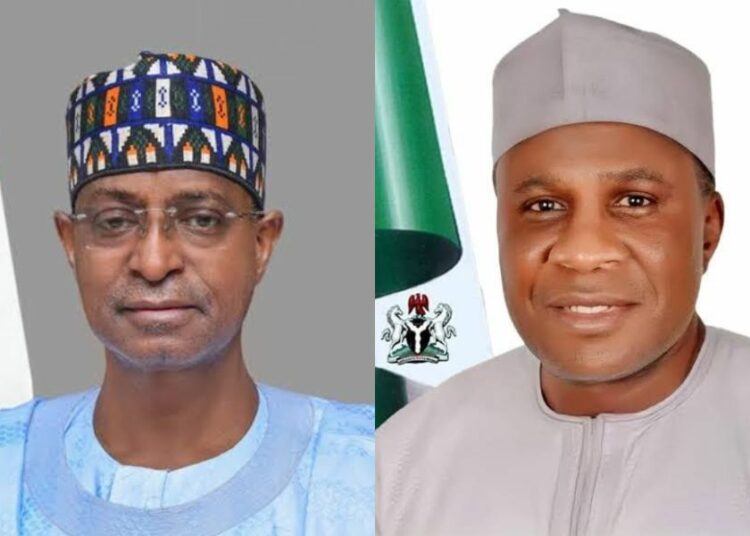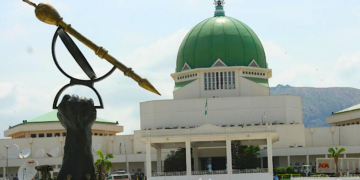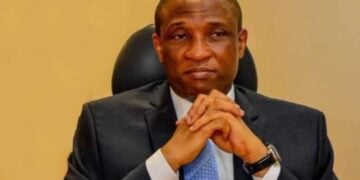The federal government has unveiled measures to rejig the livestock sector to harness its full potential and check wastages in the industry.
The Minister of Livestock Development, Idi Maiha, who gave account of his stewardship yesterday in Abuja, said the ministry had begun the implementation of major reforms in the sector to harness its N33 trillion revenue potential.
Maiha also said the ministry aims to increase the livestock sector’s Gross Domestic Product (GDP) contribution from $32 billion to $74 billion by 2035.
Similarly, his counterpart in the Ministry of Regional Development, Engr Abubakar Momoh, said only N14.1 billion of the N35.2 billion approved for its projects in 2023 and 2024 was released by the Federal Ministry of Finance, raising concerns over funding shortages.
Momoh emphasised that the amount released remains grossly inadequate to address critical infrastructural and economic development needs, particularly in the volatile Niger Delta region.
The minister said his leadership would ensure adequate supervision of the old and newly created regional development commissions to enable them meet the goals set by President Bola Tinubu.
Momoh said the ministry would ensure accountability in the commissions and execution of major projects against token projects.
The ministers spoke yesterday at the commencement of the 2025 ministerial press briefing hosted by the Ministry of Information and National Orientation in Abuja.
In his presentation, Maiha said the consumption of hides and skin, commonly known as “Kpomo”, was costing Nigeria at least N23 billion annually and depriving the country of approximately 700,000 jobs.
Maiha emphasised the ministry’s commitment to diversifying Nigeria’s economy and increasing the livestock sector’s contribution to GDP from five percent to 10 percent by 2030.
He said, “It is estimated that Nigeria’s livestock sector is valued at over N33 trillion, making it one of the most significant yet underutilised economic assets in the country. We have one of the largest livestock populations in Africa, a rapidly expanding market for meat and dairy products, and a strategic location for exports.
“However, poor infrastructure, inadequate investment, outdated production methods, and persistent conflicts between farmers and herders have prevented the sector from reaching its full potential.
“Recognising these challenges and the enormous opportunities, President Bola Ahmed Tinubu established the Federal Ministry of Livestock Development on July 9, 2024, to drive a new era of transformation, innovation, and sustainable growth.
“Our mandate extends far beyond traditional livestock management. We are here to diversify the economy, drive industrialisation, strengthen private sector participation, and secure Nigeria’s future in the global agricultural market.
“Over the past few months, we have laid the foundation for sustainable and inclusive growth. Our goal is for Nigeria’s livestock sector to become a major contributor to GDP, increasing from the current five percent to 10 percent by 2030, creating millions of jobs, and producing sufficient meat, dairy, and other animal products to not only meet domestic demand but also compete in the global market.
“The administration of President Tinubu is committed to delivering real and measurable progress that translates into better opportunities for livestock producers, more jobs for Nigerians, greater food security, and a stronger economy,” he said.
Maiha said the ministry would position Nigeria as a key player in both domestic and international markets for animal protein, alongside countries like Brazil, Argentina, and the United States.
He noted that the ministry will reposition Nigeria’s livestock sector to create over 500,000 new jobs by 2027, helping to reduce unemployment and drive rural economic growth.
He also stated that the ministry was engaging stakeholders, including traditional rulers, development partners and embassies to raise awareness on the sector’s potential.
The minister disclosed that Nigeria had forged strategic partnerships with international investors, agencies and diplomatic missions to secure technical expertise, financing and investment in the livestock industry. Partner countries include Brazil, China, the Czech Republic, Denmark, Egypt, Mexico, Morocco, Saudi Arabia, Sweden, the United Kingdom and the United States.
According to him, these collaborations would focus on opportunities in meat processing, dairy production, animal health, feed production and cold-chain logistics.
“These partnerships will be instrumental in positioning Nigeria as a regional and global hub for livestock production and export,” he stated.
He said the ministry was addressing the challenges of poor infrastructure affecting the sector by revamping grazing reserves nationwide and equipping them with feed and fodder facilities, water resources, veterinary services, and schools for pastoral families.
On his part, Momoh said the ministry is now responsible for coordinating and supervising all established development commissions to drive sustainable regional development across the country.
This marks a shift from its previous focus, which was limited to interventions aimed at improving the socio-economic well-being of the Niger Delta region.
Despite the ministry’s achievements, Momoh said several challenges continue to hinder effective project execution.
He said the dwindling budget allocations and delays in fund disbursement have created difficulties in paying contractors, leading to project delays.
According to him, Inflation has further escalated construction costs, while the short construction period due to heavy rainfall in the Niger Delta has made project implementation even more challenging.
He said the transition from the Ministry of Niger Delta Development to the Ministry of Regional Development has also introduced administrative hurdles that need to be addressed.
Additionally, the Niger Delta Development Commission (NDDC), which falls under the ministry’s oversight, faces its own set of challenges, including delayed budget approvals, noncompliance by statutory contributors – mainly oil and gas companies – and a lack of coordination among key stakeholders.
Despite funding constraints, Momoh said the ministry has prioritised infrastructure development, focusing on the completion of key road projects.
Among those completed are the Gberegolor-Ogriagbene Road in Delta State, the Okpuala-Iguruta Road (Phase 1) in Imo State, the Oron Road (Phase 1) in Edo State, and the Onuakpaka Link Bridge Road (Phase II) in Imo State.
Several new road projects are also underway, including the construction of the Agbokim Mgbabor Road in Cross River State, the Biokpa-Okpor-Ukwa Road in Cross River State, the Ezihe Onuimo-Ndiuche Ideato-Unuago Road in Imo State, the Ezeelu Okwe Amaikpa Umucheke Road in Imo State, and the Ididep Urban Roads in Akwa Ibom State.
The minister acknowledged that the high cost of implementing infrastructure projects, coupled with the region’s difficult terrain and frequent heavy rains, has posed challenges to project completion.
Beyond infrastructure, he said the ministry has made significant strides in economic empowerment and agricultural development.
It has distributed 81 mechanical tillers, water pumps and trailers to farmers across the Niger Delta and provided 32 fish smoking kilns to riverine communities.
In its efforts to maintain peace and security in the Niger Delta, Momoh said the ministry has engaged with traditional rulers, youth and women groups, and corporate entities to foster stability and development.
The minister expressed gratitude to President Bola Ahmed Tinubu for his continued support, noting that the Ministry’s interventions have led to significant improvements in peace, security, and economic activities in the Niger Delta, ultimately contributing to increased oil production and national revenue.
He said he would not allow the newly created regional development commissions to be turned the “commissions of settlement”, adding that the board members had been given clear guidelines and marching orders.
Also, the minister of state for Regional Development, Uba Maigari Ahmadu, provided updates on the ministry’s mandate and ongoing projects.
He said the Ministry of Regional Development (MRD) was established on October 23, 2024, by the Tinubu administration, replacing the former Ministry of Niger Delta to oversee regional development nationwide.
The MRD oversees five major regional development commissions: the Niger Delta Development Commission (NDDC), North East Development Commission (NEDC), South East Development Commission (SEDC), North Central Development Commission (NCDC), and North West Development Commission (NWDC).
Ahmadu highlighted the ministry’s five priority areas: Infrastructure Development, Environmental Protection and Sustainability, Community Development, Education and Economic Empowerment, Peace and Security Maintenance, and Coordination of Regional Development Initiatives.
He also provided updates on completed and ongoing road projects across various states to enhance connectivity and economic development.
In his welcome address, the minister of Information and National Orientation, Mohammed Idris, stressed that the briefing session serves as a platform to showcase the achievements of the Tinubu administration across various sectors of the economy.
He said, “It is my pleasure to welcome you to the second edition of the 2025 Ministerial Press Briefing Series. As you may recall, on Tuesday, February 11, 2025, I inaugurated this year’s series by highlighting key successes of President Bola Ahmed Tinubu’s Renewed Hope Agenda.”
He noted that the Ministries of Livestock Development and Regional Development are the latest additions by President Tinubu, established to harness the vast potential of Nigeria’s livestock industry and to drive regional development across the six geopolitical zones.





